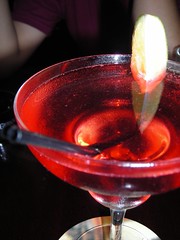今日與政政同學北上。中午在太和火車站月台集合,後試用新口岸,在落馬洲過關。途中同學甲發現無帶回鄉證,中途陣亡折返,其時已到上水。
在眾人之中北上經驗最少應是我吧。撇除年頭上深圳取書快去快返不算,上次造訪深圳已是中一的事。那時的我,年紀比回鄉證(沒錯,是證)上照片的我還要小。那時任由父母帶著走,不知往何處去,現在也是如是。同行者中有一深圳居民,及經常北上尋歡的同學,就這樣把性命財產交托予各位,想來還真是理所當然得過份。
過關所在地與地鐵站融為一體,直至買票之後,我都不知自己即將前往哪。深圳地鐵與香港何其相似,連
標誌也只差一條直線,但站名卻顯得那樣模糊。少年宮、市民中心、會展中心、香蜜湖、竹子林、老街、科學館,小小的字刻在路線圖中,蒼白無力的程度,與我對深圳的陌生感成正比。
深圳,好像把所有代表財富繁榮的東西都推往極端。六線行車仍不敷應用的大馬路、遠看像拉斯維加斯那把紐約複製起來的
酒店的中央商業區、以金銀互相輝映的
圖書館和音樂廳、像給巨人子弟就讀的幼稚園的政府總部,看起來充滿了荒謬感。吊詭的是,這些東西在我們生長的地方、讀書的地方應已見怪不怪,但荒謬感又從何而來?可能只是在理論上不相干的地方看到某些東西的存在吧。
半天的行程,除了荒謬外,還不時被不安的情緒籠罩著。最開心的大發現,應是在某書店中發現《我這一代香港人》等香港研究的書,及簡體字版的《資本主義不是什麼》,屝頁還附送許寶強近照。雖然從一般標準看來,那只是一間很普通的三聯/商務分店,談不上什麼性格可言,但在深圳的語境下,竟成為一間接近Libro(即係
呢間呀)的書店,真神奇呢。

